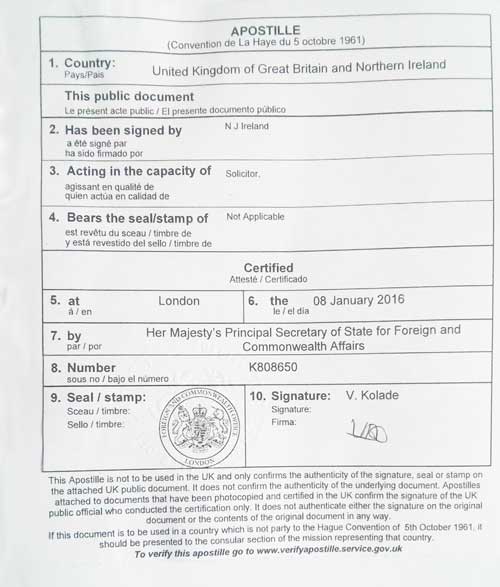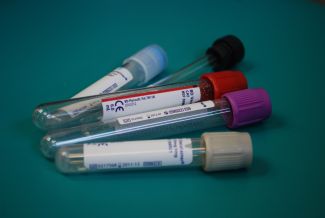
Schmidt & Schmidt covers the full spectrum of legalization services for documents issued in the United Kingdom.
The United Kingdom joined the Hague Convention on the Simplified Authentication of Documents on 21 August 1964; the Convention entered into force on 24 January 1965.
The apostille, or the “Hague apostille” is a certificate that authenticates the origin of a public document (e.g., a birth, marriage or death certificate, a judgment, an extract of a register or a notarial attestation). It confirms the authenticity of the signature and the authority of an official who signed the public document.
Since February 1, 2020, the United Kingdom is no longer an EU Member State. According to the withdrawal agreement, the documents from the United Kingdom must be certified for use in the EU with an Apostille.
Documents issued in the United Kingdom and certified with an apostille in accordance with the Hague Convention of 1961 are recognised in all Member States of the Hague Convention and do not require any other form of certification, such as consular legalization, which considerably reduces the costs and time required for the certification of documents. So far, more than 120 states have joined the Convention.
The apostille is not sufficient for use in the states that are not party to the Hague Convention. In this case, consular legalization applies to a public document.
The Convention can normally be applied to the countries that the United Kingdom submitted declarations about, i.e. in most cases - the rules apply to its overseas territories like Anguilla, Bahamas, Botswana, Cayman Islands, Falkland Islands, Gibraltar, and others.
Designated Competent Apostille Authorities in the United Kingdom
In the United Kingdom, the responsibility for certifying documents with an apostille lies with the Legalisation Office of the Foreign, Commonwealth and Development Office or its designated partners. To obtain the apostille for certain official UK documents, you are required to submit them to the Legalisation Office.
This process may be necessary if an official in another country has requested a UK document and specified that it must be legalized.
The Legalisation Office will carefully examine the document to verify if the signatures, stamps, or seals align with their own records. If they are confirmed to be authentic, the document will be legalized by affixing an 'apostille' (an officially stamped certificate).
The apostille in the United Kingdom is a square stamp in English with the obligatory heading "Apostille" and a reference to the 1961 Hague Convention in French (Convention de La Haye du 5 octobre 1961). The apostille certificate’s sides will be at least 9 centimeters long.
Types of documents

| Can be apostillized | Cannot be apostillized |
|---|---|
|
|
Specific aspects and document requirements for the apostille in the United Kingdom
The United Kingdom is among the 120 countries that recognize and issue apostilles in accordance with the Hague Convention of 5 October 1961. The apostille serves as a confirmation of the official status of a document.
Document Requirements for Apostille in the United Kingdom
To successfully obtain an apostille for your documents in the UK, it is important to ensure that your documents meet the necessary criteria. The following requirements may apply to documents issued by:
- Court: The document should bear a wet ink court seal, indicating its authenticity.
- Public Registry: Documents issued by a public registry, such as birth, marriage, or death certificates, or company certificates issued by Companies House, should meet the specified requirements.
- Government Department: If the document is from a government department, it should be signed by an official to be eligible for apostille certification. This includes documents like letters of confirmation for tax registration.
- Registered Doctor: Medical certificates signed by a registered doctor are also eligible for apostille certification.
In addition, certain documents can be legalized if they have been certified by a UK "public official," such as a notary or solicitor. For example:
- Power of Attorney, contracts, or qualification certificates are among the documents that can be legalized.
- Copies of documents, including passports or driving licenses, may also be eligible for legalization.
There are two types of apostille available: paper-based and electronic (known as 'e-Apostille'). For the paper-based option, you will need to send your documents by post or submit them in person if you are a registered business. The electronic option requires you to upload PDF files of your documents that have been electronically signed by a UK notary or solicitor. Both types can be applied for online. However, you may need to choose the paper-based option if the requesting party specifically requires it or if the document is not eligible for an e-Apostille. Please note that certain documents, such as birth certificates or ACRO police certificates, are not eligible for an e-Apostille. It is recommended to contact the person requesting the legalized documents to determine their specific requirements, including whether a single apostille for a group of documents is acceptable or if separate apostilles are needed for each document.
The apostille is issued in a uniform format. In the United Kingdom, it has the form of a printed sticker with a handwritten signature of an official, an official seal, and a hologram.
In accordance with an EU Regulation aimed at facilitating the unrestricted movement of citizens, specific public documents and their certified copies are no longer subject to the legalization and apostille requirements within the European Union, starting from 16 February 2019.
In cases where apostilles are not recognized, holders of foreign documents will need to legalize them instead. However, If the country of destination of the document recognizes and issues apostilles, then legalization is unnecessary.
If you require new original documents, the information here will help you.
Legalization of the UK educational documents for use abroad
The requirement for legalization or apostille on educational certificates is crucial for UK citizens seeking employment or residence abroad. Employers in foreign countries demand proof of the authenticity and legitimacy of education documents and signatures. The Apostille serves the purpose of attesting to the validity of these legal documents, enabling their recognition for international use. The Foreign & Commonwealth Office (FCO) in the UK plays a vital role in attesting to the genuineness of education certificates by affixing an Apostille Stamp and FCO seal. In some cases, the degree certificate may require additional verification by a UK solicitor or Notary Public to ensure its authenticity for the FCO.
The process of legalizing a degree/diploma certificate is simple and can be completed within a few minutes. After submitting the application, the education documents need to be presented to the FCO for legalization. It is advisable to send the original certificate, as many countries do not accept copies of legal documents. Payment of fees can be made through bank transfer or credit card, with the necessary banking information and paperwork provided for bank transfers.
The requirement for an Apostille on a degree/diploma certificate arises when UK students seek employment opportunities in foreign countries. The degrees or certificates obtained in the UK may not be automatically recognized in these countries. Therefore, the education certificates need to be legalized or apostilled. The Hague Convention of 1962 established the recognition of document apostilles, which include educational degrees and various other legal documents such as passports, birth certificates, marriage certificates, and death certificates. These apostille stamps issued by the FCO serve as authentication for international acceptance.
When dealing with overseas authorities, including immigration offices, employers, or universities, it is important to demonstrate that your qualification originates from a trustworthy UK institution. To fulfill this requirement, a Notary may be needed to verify the award or certify a true copy of the original.
Certain countries impose additional criteria for granting legal recognition to UK documents. In many cases, an Apostille from the UK Foreign & Commonwealth Office is mandatory, and in certain circumstances, further Consulate Legalisation may be necessary.
It's worth noting that the UK Foreign & Commonwealth Office exclusively affixes an Apostille on awards issued by accredited UK institutions. This ensures the authenticity and reliability of the qualification.
Recognition of the authenticity of public documents within the EU
Regulation on public documents (EU) 2016/1191 of 6 July 2016
Furthermore, Regulation (EU) 2016/1191 of 6 July 2016 on public documents simplifies the circulation of certain public documents that must be presented in an EU Member State and have been issued in another EU Member State, thus exempting public documents from the confirmation of authenticity with the Apostille with the aim of reducing administrative burden and costs for citizens.
Consular legalization of documents from the United Kingdom
Should a document be used in a country that does not recognize the Hague Convention, such as Thailand, Egypt, the United Arab Emirates or other countries not listed as a contracting party, the procedure of consular legalization, also called “embassy attestation”, applies. For a complete list of countries that accept and use apostilles, click here.
Consular legalization is the process of authenticating or certifying a legal document so a foreign country's legal system will recognize it as with full legal effect that is carried out by the diplomatic or consular mission of the country in which the document is to be used.
This procedure is required when the destination country does not recognize or accept the apostille certification. One needs to submit the original document, along with any required copies or supporting materials, to the respective consular office. The consular officials will review the document, verify its authenticity, and affix their seal or stamp to certify its validity.
The consular legalization process may require additional steps like obtaining translations of the document into the language of the destination country or providing additional supporting documentation as requested by the consular office.
It is up to the diplomatic mission to decide about the authentication procedure.
The specific requirements and procedures for consular legalization may vary depending on the regulations of the destination country.
Consular legalization is a more time-consuming and expensive procedure than the apostille, in which the certificate goes through several pre-certification procedures and is then certified in the consulate of the destination country in the United Kingdom. Often the document has to be translated by a certified translator into the official language of the destination country.
It should be noted that the certificate is only valid in the country whose consular mark it bears and cannot be used in other countries.
The duration of consular legalization of a document is generally not limited, but the validity of the certificate itself might be restricted.
The main differences between an apostille and consular legalization of documents
The common feature between apostille and consular legalization is that they authenticate an official document for presentation to institutions in another country. However, they have many differences.
| Apostille | Consular legalization | |
|---|---|---|
| Validity | Can only be used between countries that are members of the Hague Convention on the Simplified Legalization of Documents. | Use between States one or both of which is not a member of the Hague Convention, or where one of the contracting States has protested the accession of the other |
| Obtaining difficulty | Moderate. To obtain an apostille, contact the competent authority of the country where the document was issued | High. For consular legalization must contact various authorities and consulates of the country where the document was issued. |
| Advance Authentication | Not required | A prior certificate from the issuing authority is required |
| Legalization at the Consulate of the country of destination | No need to contact the Consulate of the country of destination | The final step of legalization takes place in the consulate of the country of destination, usually in the country of issue |
Apostille and consular legalization in all cities of the United Kingdom
Schmidt & Schmidt provides apostille and consular legalization services for public documents originating from all regions across the UK. We handle the entire process, from document review to obtaining the necessary certifications, ensuring that your documents are valid and recognized internationally. With our reliable services, you can confidently use your British public documents abroad.
Procurement of documents from the United Kingdom
Often important documents are lost or damaged, or current copies of the documents need to be obtained. In this case, it is necessary to request a duplicate of the documents. It is not unusual for people who have left the United Kingdom to encounter difficulties with this procedure. Our service allows you to apply for your documents remotely in the United Kingdom, and we can arrange for your documents to be sent by courier anywhere in the world.
Certified translation of documents from the United Kingdom
Copies and transcripts of civil status documents can be translated into any language by a sworn translator in the United Kingdom or the translation can be done in the country of destination. We offer certified translations of civil status documents with further certification. The cost of the work is calculated according to the volume of the document in question.
Does the translation have to be certified by an apostille?
Any foreign document issued in one country and required for use in another country must be legalised. It is important to remember that a translation of a document that has already been apostilled that has been made in the United Kingdom will still have the status of a foreign document for which an apostille is required. Consequently, many authorities may not accept certified translations from the United Kingdom. To avoid this, translations should be made in the country where the document is to be used.

























































